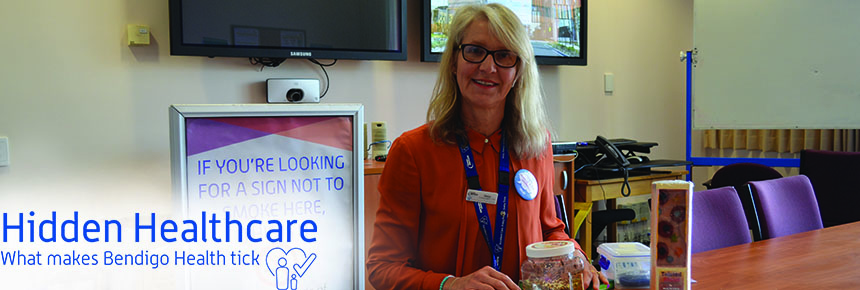 Tobacco Treatment Nurse Specialist Sharyn Gibbs has been helping people withdraw from nicotine for a number of years.
Tobacco Treatment Nurse Specialist Sharyn Gibbs has been helping people withdraw from nicotine for a number of years.
When dealing with addiction, Sharyn Gibbs has learnt to never write anyone off.
Bendigo Health Tobacco Treatment Nurse Specialist (TTSN) recalls helping an older, dishevelled man go from 100 cigarettes a day to five and eventually quitting a number of years ago.
“He was motivated which helped. At first I would have written him off but it made me realise that you can do it with anybody if they want to,” she said.
The registered nurse, who was surrounded by smokers as a youngster, has been helping people withdraw from nicotine for a number of years.
“People underrate the nature of smoking and how powerful the addiction is. So often they might understand why people are alcoholics or substance users and support them but unfortunately it’s not the same with smokers,” she said.
Bendigo Health first employed a TTSN in 2014 but the approach toward patients that smoke has become more nuanced over the years, Sharyn said.
“From the beginning our role was very much trying to get people to quit but we didn’t gain a lot of acceptance and it was too overwhelming for some. Since then we’ve focused our efforts on supporting the smoker,” she said.
“Once you start telling people what to do you lose them.”
In 2008 Bendigo Health became a smoke free hospital, which included introducing a policy to determine a patients smoking status.
Sharyn’s role is to train clinical staff on how to begin discussions about quitting with a smoker and, if the response is positive, they receive a referral to a TTSN.
“We understand that sometimes having that conversation is not the number one priority for clinical staff but we’ve tried to get staff to buy in and understand why it’s important for them,” she said.
Since 2016, the TTSN had 783 referrals, with 26 per cent of those patients identifying as non-smokers after follow ups post discharge*, and a further 30 per cent saying they had reduced their smoking.
Sharyn acknowledged that approaching the subject of quitting with smokers during a hospital stay did not sit well with some.
“There was controversy that it’s not a good time, it’s a stressful time and they’ve got other things to worry about, but it seems for some it’s a change of environment that’s helped, they’re often unwell, and perhaps they get to try nicotine replacement therapy for the first time,” she said.
Data indicates that two thirds of the TTSN referrals since 2016 indicated their thoughts of a quit attempt were directly triggered by hospital admission.
“Some people have said they were so scared they thought they were going to die that now is the time they’re going to make a change but change is not always easy unless you’ve got the resources,” she said.
Bendigo Health has a number of resources available for patients considering quitting. More info: https://www.bendigohealth.org.au/smoke_free/
*Follow up conversations range from 2 weeks to 3 months from discharge.

For more in our Hidden Healthcare series, click the link below.
Hidden Healthcare